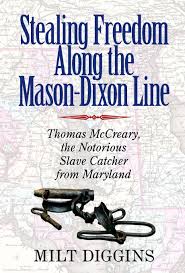 Editor’s Note: There has been an avalanche of important new scholarship on the Underground Railroad over the last twenty years, and yet there remains a critical gap in the literature. Scholars know comparatively little about the slave catchers (or kidnappers) who chased after the fugitives (or freedom seekers). This is a challenge that Maryland historian Milt Diggins has tackled in an important new biography of Thomas McCreary, who spearheaded slave-catching operations along the Mason-Dixon Line during the antebellum period. Teachers and students should know more about such men and their methods and so we asked Diggins to share a post at Blog Divided that would help highlight the main insights of his book, which can be purchased from the Maryland Historical Society or at other online retailers such as Amazon or Barnes & Noble.
Editor’s Note: There has been an avalanche of important new scholarship on the Underground Railroad over the last twenty years, and yet there remains a critical gap in the literature. Scholars know comparatively little about the slave catchers (or kidnappers) who chased after the fugitives (or freedom seekers). This is a challenge that Maryland historian Milt Diggins has tackled in an important new biography of Thomas McCreary, who spearheaded slave-catching operations along the Mason-Dixon Line during the antebellum period. Teachers and students should know more about such men and their methods and so we asked Diggins to share a post at Blog Divided that would help highlight the main insights of his book, which can be purchased from the Maryland Historical Society or at other online retailers such as Amazon or Barnes & Noble.
Guest post by Milt Diggins
In 2007, while serving as volunteer editor for the Historical Society of Cecil County in Elkton, I came across a nineteenth century newspaper article that caught my attention. Fredrick Douglass referred to “Thomas McCreary, the notorious kidnapper from Elkton.” No one at the historical society had ever heard of McCreary, and apparently neither did anyone else in the county. Ask people to name a slave catcher and kidnapper and many could name Patty Cannon. The story of the infamous Cannon-Johnson gang is encrusted with local myth, but remove the layers of folklore and history will still reveal a formidable gang of kidnappers with a deserved reputation for viciousness. But why did Douglass call McCreary a notorious kidnapper? That question, and the questions that followed, drove seven years of research and writing. Patty Cannon may be better known, but reconstructing the story of the once notorious but nearly forgotten Thomas McCreary reveals him to be a more significant figure for examining the controversy over slave catching and kidnapping.
One reason for McCreary’s historical importance was the time period in which he gained notoriety. Cannon died in prison in 1829. The debate in Congress over the abolition of slavery heated up in the 1830s. The Prigg vs Pennsylvania decision in 1842 proclaimed the constitutional right of slave catchers to capture suspected fugitives without hindrance by state governments, a guiding principle for slave catchers and kidnappers like McCreary. Northern states attempted to provide some protection for citizens of color through personal liberty laws, like Pennsylvania’s, revised and enacted in 1847. The Fugitive Slave Act of 1850 increased federal responsibility for recovering escaped slaves by authorizing US circuit court commissioners to try fugitive cases. The most violent reaction to that law occurred at Christiana, Pennsylvania, one decade before the outbreak of the Civil War. McCreary operated within this series of events, and his actions were shaped by them. His activities added fuel to the animosity between Maryland and Pennsylvania over the slavery issue and the distinction between slave catching and kidnapping.
McCreary benefitted from the support of his community, adding a second dimension missing in the story of the Cannon-Johnson gang. Proslavery advocates prized his forays into Pennsylvania and his prowess for capturing accused runaway slaves. Local newspapers praised McCreary as Elkton’s hometown hero. The editors defended his “arrests” to counter criticism from Pennsylvanians, and from Delawareans, most notably Thomas Garrett, and the editors of the Blue Hens Chicken, an antislavery newspaper.
McCreary’s relationship with the political elite is a third reason for his significance. McCreary was deeply in debt when the county declared him insolvent in December, 1838. Two months later, the governor appointed him to a state position in Elkton, an indication that McCreary had found favor with Cecil County’s political bosses. In time that local political connection would extend to the state level. These political relationships would work to McCreary’s advantage.
Patty Cannon’s villainy was widely recognized. Opinions divided over McCreary, mirroring the growing national divide. Elevated to the status of state hero, McCreary represented Maryland’s insistence on the unrestricted right of slave catchers to seize blacks in Northern states and force them into the hands of slaveholders. Whereas opponents criticized McCreary’s questionable slave catching tactics and condemned him for obvious kidnappings, proslavery Marylanders valued McCreary as an effective slave catcher. In their view, it was politically impossible for him to be a kidnapper, no matter what the likes of abolitionists like Fredrick Douglass or Thomas Garrett said, or what a Pennsylvania jury might have said if given the chance.








Related Articles
2 users responded in this post
Wow. Never heard the name “Thomas McCreary” till now. I guess a lot still needs to be written and taught in colleges about slavery. Online education can as well help supplement what the schools have done.
Wow. Never heard the name “Thomas McCreary” till now. I guess a lot still needs to be written and taught in colleges about slavery.
Leave A Reply
Please Note: Comment moderation maybe active so there is no need to resubmit your comments